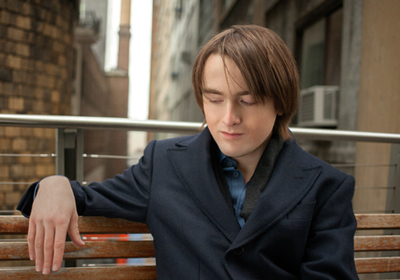by Mike Telin

On Thursday, March 19 at 7:30, Daniil Trifionov will perform Shostakovich’s Piano Concerto No. 1 for piano, trumpet, and orchestra, featuring TCO’s principal trumpet, Michael Sachs, under the direction of Jahja Ling. The all-Russian program will also include Rachmaninoff’s Symphony No. 2. Additional performances will take place on Saturday at 8:00pm and Sunday afternoon at 3:00.
When we spoke on Wednesday morning, Trifonov had only arrived back in Cleveland the evening before. Earlier in the month, the pianist was recording a new CD to be released later this year. Last Friday, he performed a sold-out recital for Boston’s Celebrity Series. I began our conversation by asking him to say a few words about the Shostakovich concerto.
“First of all, this concerto is incredible in its sarcastic humor, which is depicted in every movement,” he said. “It also has many of Shostakovich’s popular stylistic characteristics, such as the rapid development of the musical material. Both of these things make it one of the most exciting concertos. The concerto is also a dialogue between the orchestra (strings only), the piano, and the trumpet. It’s written almost like a piece of chamber music. There is a lot of polyphony and musical interaction between the performers.”
Is sarcasm part of Trifonov’s own personality? He laughs. “I guess when artists play such music, inevitably it reflects part of their personality.”
In 2010, the Russian-born pianist won Third prize at the International Chopin Piano Competition in Warsaw. In 2011, he won the First Prize at the Arthur Rubinstein International Piano Master Competition in Tel Aviv, and a few weeks later was awarded the First Prize, Gold Medal, and Grand Prix at the XIV International Tchaikovsky Competition in Moscow. Since then the pianist has embarked on a stellar career.
Even with all of his successes, Trifonov takes every opportunity he has to give credit to his teachers for their excellent guidance. During interviews he often speaks about Tatiana Zelikman at Moscow’s Gnessin School of Music, and Sergei Babayan at the Cleveland Institute of Music. He still plays for Babayan as often is possible. “There is never a period in the life of an artist when you can say, OK, there is no longer a need for a teacher’s advice. It is always very important to listen to what your mentors have to say. For example, Sviatoslav Richter played for his teacher, Heinrich Neuhaus until Neuhaus’s death. So whenever I have an opportunity, I try to play a new program of recital pieces or concertos for Sergei.”
What has been the biggest adjustment Trifonov has had to make in his life after finding himself thrust into the international concert scene? “Life has changed a lot now, but I would say the most important thing was discovering the value of time,” he said. “For instance, during an intensive tour, when a lot of time is taken up with travel, it becomes even more important to find the opportunity to practice and to learn new repertoire. If there is no progress in the learning of new repertoire, it can be quite damaging to a career. So yes, the challenge is finding the time to learn new repertoire, even when you are on an intensive tour.”
In an interview at the Verbier Festival last summer, Trifonov said that it is important to fall in love with every new piece you are learning. Has he ever encountered a piece of music that he has simply not been able to fall in love with? His self-effacing answer was admirable. Again he laughed and said, “If that is ever the case, then it is the artist’s problem. Maybe it’s because you’ve tried to learn the piece too early in your career. And, for some pieces, maybe you just need to play more works by the same composer. Every case is different, but it’s always helpful when you do love the music that you are playing.”
Trifonov has also recently added the playing of chamber music to his ever-expanding list of musical pursuits by touring with violinist Gidon Kremer. “In the last couple of years I have been playing mostly recitals and concertos. But of course it is a very valuable experience to play chamber music, especially when you have the opportunity to play it with such masters as Gidon Kremer. You can learn a lot from that experience. Doing this exposes me to a lot of new repertoire, for example the sonata by Polish-born composer Mieczyslaw Weinberg. He used to be less known, but thanks to Kremer, his music is beginning to be performed more often, and it was very interesting for me to play it.”
On March 5, Daniil Trifonov celebrated his 24th birthday. How was the celebration? “Actually it was in the middle of the recording sessions, but I was eating my birthday cake while listening to the recording tracks.”
Photo: Opus 3 Artists (Dario Acosta)
Published on ClevelandClassical.com March 18, 2015.
Click here for a printable copy of this article



